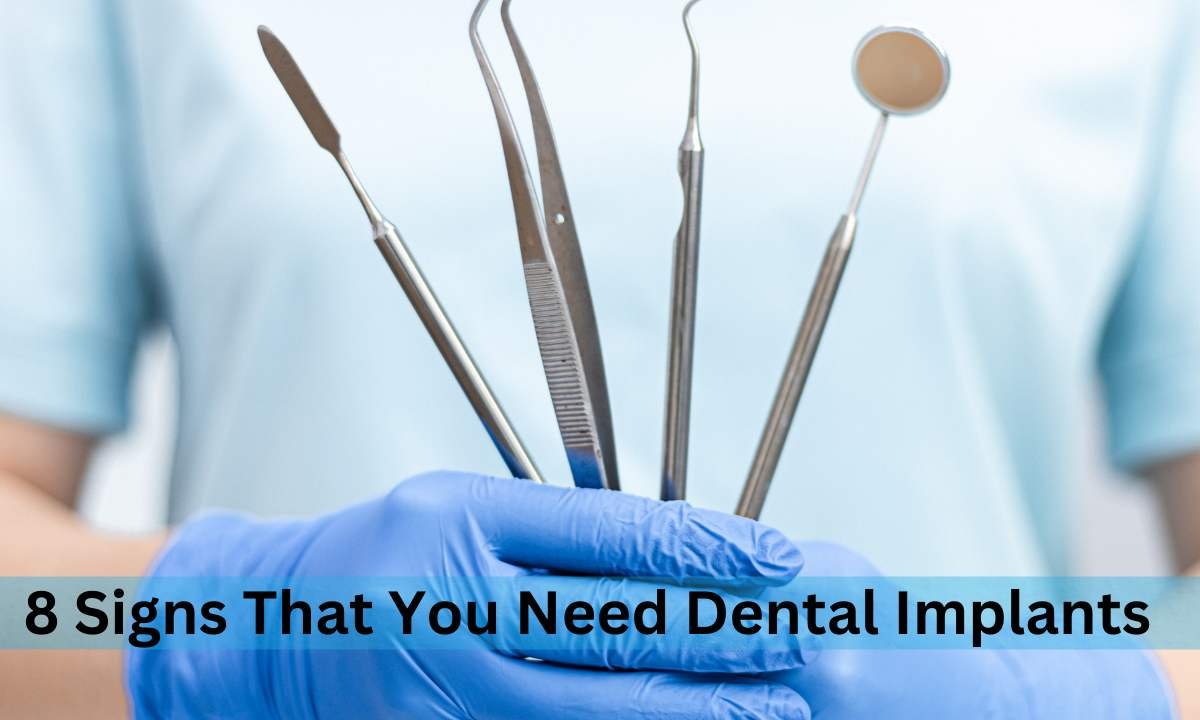Do you know whether you should have dental implants or not? The absence of teeth or other dental problems can be a great source of pain. However, when do you consider dental implants? In this article, we will discuss eight signs indicating that it is time to get dental implants for a better smile and healthier teeth. With these signs in mind, you can act and get the required dental procedure to reconstruct your teeth and smile.
Implants are small screws made of titanium, which are implanted into the jawbone and work as tooth roots. Once the implant has.set firmly in the gum, a crown (the top or biting part of the tooth) is then fixed, giving the patient a realistic artificial tooth. In addition to reconstructing an individual’s smile, it aids in preserving the jawbone by mimicking the action that real teeth have on this structure.
The Advantages of Dental Implants
Dental implants not only help people have a perfect set of teeth but also give several other advantages. Here are these:
- Improved Appearance: Dental implants are fixed into the jaw and have the feel and look of natural teeth. They replace your missing teeth and support the structure of your mouth while doing so, unlike other dental implants, which look and feel fake or dramatically change facial contours with time.
- Better Oral Health: Not only do implants serve as artificial teeth, but they also do not allow adjacent teeth to shift positions and thus help to keep your teeth aligned. Depending on them does not involve the cutting of sound teeth, keeping your beautiful smile intact.
- Durability: Dental implants are long-term fixes. If well maintained, they can serve a lifespan longer than even other dental implants or bridges and are way more stable.
- Improved Comfort: Unlike other forms of dental implants, implants do not move and you may be prone to irritation from other resources. This makes them less limiting in terms of eating, speaking, and or use in general day activities.
- Confidence Boost: Implants give you a welcome boost in self-confidence, as you can smile, eat or even speak without any complications as is the case with missing teeth.
The Following Reason You Are A Good Candidate For Dental Implants
The second step is knowing the benefits of getting dental implants. Now, let’s consider the major predictors that might have to be used to determine your chances of receiving the procedure. Here are the following steps of the dental implant procedure:
- Step 1 – Consultation: First, your dentist will assess your teeth and gum condition and then he or she will decide whether you’re suitable for implants or not.
- Step 2 – Implant Placement: It is typically installed surgically into the jawbone otherwise called the implant post.
- Step 3 – Healing Period: That means over the next few months, the implant grew to become an inseparable part of the bone through osseointegration.
- Step 4 – Abutment Placement: After the implant has cemented to half of the length of the bone, a second component of the implant known as the abutment is attached on top of the implant.
- Step 5 – Crown Placement: at last, a crown specially designed to join with the abutment is put and fastened to complete the implant.
Now after having an understanding of the procedure, you just need to know the key factors that identify you are the right one for the dental implant:
1. Missing One or More Teeth
The first indicator that you require dental implants is tooth loss. Regardless of the reason such as injury, decay, or even age, one can notice that congenital or periodontal disease missing teeth will affect not only your smile. Missing teeth will result in some form of disabilities while chewing or speaking, and will also cause other teeth to shift in that space. If you have not been able to smile in photos or prefer keeping your mouth closed when speaking, it is high time that you visit your dentist and have dental implants. They are meant to restore both form and function and be used to fill gaps of missing teeth in the dental arc.
2. Difficulty Chewing or Eating
Have you become a selective eater because of some produce that is hard to chew? Perhaps, you’re trying to have a problem chewing foods such as apples or steak. This may mean that you should have a dental implant. When some or all of the teeth are missing or broken it becomes difficult to chew food and this greatly influences your diet and health. Implants work around this problem by offering a favorable base for artificial teeth when set thus enabling a client to regain their preferred diet without much pain.
3. Bone Loss in the Jaw
You would be surprised to learn that loss of bones in your jaws may be occasioned by missing teeth. When you lose a tooth, the enamel no longer puts pressure on the jawbone as it does on the tooth root. In the long run, it weakens the bone to the extent that facial features appear to recede or the person looks old. Dental implants keep the jawbone healthy and strong because the implant functions as an artificial tooth root for the support of the teeth.
4. Loose or Ill-Fitting Dentures
If you already have dentures and experience their shifting or discomfort, it may be high time to consider dental implants. There are cases when dentures become loose, and while eating, speaking or sometimes even laughing it may become embarrassing. Implants are a more stable approach to dentures in that implants give you something to attach the dentures to so you have no worries related to your smile.
5. Crack or Fracture of the Extent of Splitting of the Tooth Substance
Although not all patients with cracked or broken teeth require extraction, in cases where the extent of tooth decay is such that a filling or crown cannot solve the problem, then a dental implant may be the answer. In its worst-case scenario, severely affected teeth wear down the roots and cause a lot of discomfort, spread infection, or lead to additional harm to other teeth. Dental implants are a durable solution to replace a missing tooth or denture, so your mouth does not deteriorate.
6. Symptoms That Indicate A Condition Of Bacterial Infection Or Tooth Decay
Neglecting an infection or tooth decay may lead to an extraction of the affected tooth. If your dentist has advised extraction of a tooth because of severe decay or infection, then a dental implant may be the best fill-in for the lost tooth. In addition to improving the aesthetics of your teeth and smile, implants prevent such subsequent dental complications as shifting of teeth or other related problems that may result from the absence of a natural tooth.
7. If Dental Implants Are Produced After an Accident
Oftentimes though, the tooth may be lost due to an accident of some form or the other which causes its destruction. If you have had an injury to the mouth or any form of dental trauma that has caused a tooth to fall out, an implant is a good way to get back your smile almost immediately. Dental implants are a more permanent solution for replacing teeth than these practices; the implants work like natural teeth and look like them as well.
8. Sunken Facial Appearance
Have you observed that you have drooping cheeks or an appearance that makes them look old? This is noticeable in case the teeth are missing and so the jawbone starts shrinking as time goes on. The outcome is that beauty is lost and facial structure disappears, and you are left looking any older than you indeed are. However, dental implants prevent the deterioration of the jawbone which supports your face hence giving you a youthful look.
Conclusion
It is therefore important to be aware of some of the factors which might show that you need to get dental implants. If you have missing teeth, loose dentures, or difficulties in chewing, dental implants may be the right one for you. They are accustomed not only to bringing back the aesthetics of your smile but also to maintaining the form and function of the jaw. Don’t wait, if any of these signs you relate with, you should visit the dentist to discuss the ways you can save your tooth.
FAQs
Are dental implants painful?
This procedure needs to be carried out under anesthetic since most patients do not even have minor discomfort. After the surgery, you will feel some pain and may have swelling that can be relieved with usual pain management agents.
For how long are the dental implants effective?
Dental implants are long-term treatments that in the right hands, you need to take great care, regular checkups, and oral hygiene to keep it long-lasting.
Can anyone get dental implants?
To qualify for dental implants most people do but if patients cannot sustain implants in the lower jaw by themselves due to lack of bone mass or the existence of certain illnesses more operations may be required traditionally people with Alzheimer’s disease also cannot go for dental implants.
How long does it take for a dental implant to be done?
The whole period, from healing, can take about several months. But then each case is unique, and depending on your situation, the dentist will advise when you should return.
What are the costs of dental implants?
The cost may vary and differ significantly depending on the quantity of implants you require and the country you live in. It is advisable to contact your dentist to get a detailed estimate of the amount of money you are going to spend.
More Article:
HDHub4u: The Ultimate Destination for Free HD Movie Streaming!

